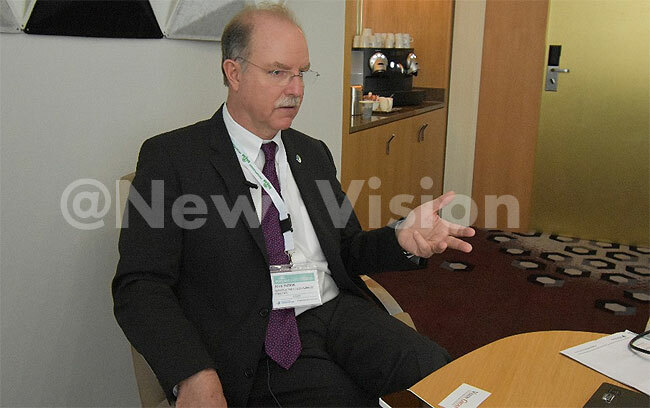Five organisations win reproductive health grants
The winners include Marie Stopes Uganda, who were awarded $40,000 to establish social marketing of menstrual cups in Uganda.
PIC: A panelist delivering his comments on reproductive health in Brussels, Belgium. (Credit: Hope Mafaranga)
HEALTH
BRUSSELS - Five organisations have won grants to implement different reproductive health projects.
John Skibiak, the director of Reproductive Health Supplies Coalition (RHSC), announced the grant recipients during the 18th General Membership Meeting of RHSC in Brussels, Belgium.
The winners include Marie Stopes Uganda, who were awarded $40,000 to establish social marketing of menstrual cups in Uganda.
Management Sciences for Health received $104,178 to integrate oxytocin into the Exocrine Pancreatic Insufficiency (EPI) cold chain.
Gynuity won $150,204 for oral antihypertensive therapy, seen as a pathway to efficiently reducing maternal complications from severe hypertension in low resource environments.
William Davidson Institute got $64,946 to analyse the private sector distributor landscape in reproductive health supplies.
VillageReach, too, featured among the winners. They received $50,000.
Held under the theme: "Pour Elle" (For Her), the RHSC meeting showcases the accomplishments of partners from across the world in meeting the reproductive health needs of women, with a special focus on achievements in Francophone Africa.
"This region (Francophone Africa) boasts some of the world's greatest reproductive health successes, but also some of the most troubling statistics and seemingly intractable challenges," Skibiak said.
He said a woman's life can hinge on the response she gets when she arrives at a health facility.
"Will she find choice or simply empty shelves?"
Skibiak talked of the need to improve supply chains and access to quality products to support womens' needs.
It is understood that representatives from more than 60 governments, private companies and foundations have pledged at least $2.5 billion to expand access to family planning worldwide.
According to Skibiak, some 220 million women around the world do not use any family planning method due to lack of access to contraception.
"And each year, we still confront hundreds of thousands of unnecessary unsafe abortions. But we have made huge strides in breaking down the supplies barriers that contribute to these challenges," he said.
Funding remains key.

John Skibiak the director of of RHSC. (Credit: Hope Mafaranga)
Efforts have led to more products being prequalified by the World Health Organisation (WHO).
Skibiak said there also need for the world to engage the young people to ensure they have access to sexual and reproductive health rights and services and also making decisions on the services they need to access.
Maryjane Lacoste from the Bill and Melinda Foundation said they will have to convince the private sectors to invest in reproductive health supplies to supplement countries that have less budgets to fund such services.
"We need to step up to commitments we have made in the past in meeting the demand of reproductive health commodities to ensure that those countries that cannot meet their demands have access to enough supply of reproductive health commodities," she said.
Dr. Arsene Binanga, the director of Family Planning for Tulane University in Kishasha, DR Congo, said the supply chain is in A mess because no one is giving the community information, which has led his country into shortage of reproductive drugs for the past four months.
"Some of the young people do not know that some of the contraceptives methods exist, and it is very true that the supply is the problem.
"Sometimes young people have to walk 18km to buy the morning after-pills and those that cannot get it end up with unplanned pregnancies," he revealed.
Shamirah Nakalema, the project officer and lead trainer at WoMena Uganda, said they will train more girls to use menstrual cups in Mbale, Gulu, Kampala, Mbarara, Entebbe, Arua and Kabale.
They are working closely with Marie Stopes Uganda to integrate the menstrual cups into their reproductive health activities.
"Monthly period has contributed to school drop-out of girls and this will help us to solve this challenge because the menstrual cups can be used for ten years," she said.
Dorothy Thomas of Seattle-based VillageReach, said they will use the grant to improve reproductive health supplies chains costing evaluations.
They hope to empower supply chain suppliers and managers to improve their activities. They will also improve the availability of reproductive health production.
Thomas said the fund will also enable them venture into new areas, especially in evaluation. They also plan to empower local governments to effectively carry out their processes without depending on external experts.